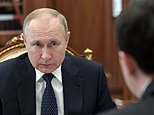At first glance this is progress. But words are cheap, it’s actions that count, says Dr NEIL MELVIN
At first glance this is a progress towards peace. But words are cheap… it’s action on the ground that counts, writes Dr NEIL MELVIN
<!–
<!–
<!–<!–
<!–
(function (src, d, tag){
var s = d.createElement(tag), prev = d.getElementsByTagName(tag)[0];
s.src = src;
prev.parentNode.insertBefore(s, prev);
}(“https://www.dailymail.co.uk/static/gunther/1.17.0/async_bundle- -.js”, document, “script”));
<!–
DM.loadCSS(“https://www.dailymail.co.uk/static/gunther/gunther-2159/video_bundle- -.css”);
<!–
At first glance, the temptation is surely to cheer the news that Russia has said it will ‘drastically reduce’ its combat operations around the Ukrainian capital Kyiv and the northern city of Chernihiv.
Certainly, that is the view of Turkey’s President Recep Tayyip Erdogan, who has been hosting face-to-face talks between Russian and Ukrainian delegations in Istanbul.
Erdogan hailed Russia‘s announcement yesterday in the wake of these talks – along with proposals mooted by Ukraine to become a ‘neutral state’ – as ‘the most significant progress’ towards peace since Vladimir Putin launched his horrific invasion five weeks ago.
I have no doubt that the luckless residents of both Ukraine’s besieged capital and of Chernihiv – where tens of thousands are trapped without running water and electricity – will welcome this development.
President Recep Erdogan, of Turkey, speaks at peace talks between Russian and Ukrainian delegations in Istanbul. He hailed Russia’s announcement has said it will ‘reduce’ combat operations around Kyiv and Chernihiv as ‘the most significant progress’ yet
Sadly, however, I would also firmly caution against pinning too much hope on these announcements.
Words, after all, are cheap: and it is actions on the ground the matter.
Russia’s apparent climbdown must be seen in the context of Putin’s long-held wider ambitions for Ukraine.
He wants to weaken his democratic neighbour, prevent it from joining Nato and ensure that it can never escape from Russia’s ‘sphere of influence’.
The first step in executing these ambitions was his 2014 annexation of Crimea and the occupation of parts of the Donbas region by Russian separatist groups.
Emergency personnel work at the site of the regional government headquarters in Mykolaiv, Ukraine. Dr Neil Melvin urged ‘caution against pinning too much hope’ on pronouncements of peace
These strategies only succeeded in driving Ukraine further towards the West.
The second step has been unfolding in recent weeks before the world’s horrified eyes: a full-scale invasion, initially intended to seize Kyiv and depose President Zelensky under the absurd guise of ‘de-Nazifying’ Ukraine.
As we know, the Russian despot failed in this planned lightning strike.
Some 10,000 Russian troops now are dead, several initial gains have been lost, the Russian economy has been crippled by sanctions and its international reputation destroyed.
Putin knows he has badly over-reached – and must now see that the victory he imagined is beyond his grasp.
That is the crucial background to yesterday’s claims of progress in negotiations between the warring countries.
Despite overtures towards peace, Vladimir Putin still wants to win in Ukraine, writes Dr Melvin
Putin knows that if he is to remain in power, he cannot be seen to have failed.
As such, he may well be using the veil of diplomacy to achieve his goals: buying time so that his forces can regroup and resupply while he plots his next move.
That is not to say that these latest developments are bogus or mere propaganda.
I have no doubt that Erdogan is sincere when he speaks of his hopes that they may be a prelude to peace.
Yet whatever common ground has been found on the shores of the Bosphorus, this is definitively not a peace agreement – nor even a ceasefire.
Russia may be pulling back from two cities, but in the centre and south of Ukraine, the bloodshed goes on. Putin still wants to win – indeed, believes he must win.
Yes, there is a flickering of hope. But this war has a long way to run.
Dr Neil Melvin is Director of International Security Studies at the Royal United Services Institute
![]()


